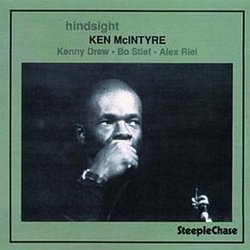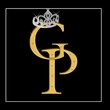| All Artists: Ken Mcintyre Title: Hindsight Members Wishing: 2 Total Copies: 0 Label: Steeplechase Release Date: 7/27/1994 Album Type: Import Genres: Jazz, Pop Styles: Avant Garde & Free Jazz, Modern Postbebop, Bebop Number of Discs: 1 SwapaCD Credits: 1 UPCs: 716043101429, 723721853129 |
Search - Ken Mcintyre :: Hindsight
 | Ken Mcintyre Hindsight Genres: Jazz, Pop
|
Larger Image |
CD DetailsSimilar CDs |
CD ReviewsIt is hard to review a gift. greg taylor | Portland, Oregon United States | 08/01/2004 (5 out of 5 stars) "One of my pet theories is that a person's spirit is manifest in everything they do. A person who is emotionally guarded will express themselves in a constrained manner. Someone who is emotionally generous will be expressive in a much more open and extended manner.
Mukanda Ken McIntyre must have had an enormously generous spirit. He emerged on the scene in the early sixties and did a fine series of recordings all of which are available on Amazon. These culminated in the classic Looking Ahead CD where he was joined by Eric Dolphy. For the next several decades he was noted for his work with Cecil Taylor, Bill Dixon, Craig Harris and, later, with Charlie Haden's Liberation Orchestra. He also became an educator teaching in the public schools, Wesleyan, Fordham and (for twenty-four years) at the SUNY campus at Old Westbury. Somehow in the seventies he found time to record a superb series of albums on Steeplechase. This CD, Hindsight, was the first and was released in 1974. On this album McIntyre is looking back at the tradition and at some of the giants in that tradition who had encouraged or inspired him over the years. He is paying his respects to Coltrane (Naima), to Rollins (Sunnymoon For Two), to Hawkins (Body and Soul). Three of the songs are McIntyre originals (Bootsie, Mercedes and Airebil). Several things are worth noting about McIntyre's style. He is one of the truely great multi-instrumentalists in the history of jazz, being capable of playing beautifully on the alto sax, the flute, the basson, the oboe and the bass clarinet. On all of them he plays with great tone and ease. The other thing that is worthy of remark is McIntyre's style. His solos are rarely bravura technically. He largely eschews extended technique. His harmonic concept covers the gamut. He was comfortable playing with Cecil Taylor and with Eric Dolphy and he is comfortable playing with much more conservative players. (By the way, I rarely say anything critical about another Amazon reviewer but the individual who reviewed McIntyre's Looking Ahead CD and wondered whether McIntyre had really absorbed Parker's be-bop innovations needs to hush). The thing about McIntyre that throws people is that he tends to focus on the core soul of the melody and on the rhythm of the song. His variations could be advanced harmonic but on these sessions he tends to stay with a soul bop framework. McIntyre is one of those players for whom this works everytime- sort of like Clifford Jordan or Yusef Lateef. And this gets to my point which may be obscure but what these men play is the largeness of their spirits. To my ears, Ken McIntyre had a huge spirit. His session mates are superb. By this time, Kenny Drew had lived in Denmark for ten years and had formed an outstanding rhthym section with Bo Stief on the bass and Alex Riel on the drums. The other CDs in the Steeplechase series are equally good. They are Home, Open Horizon, Introducing the Vibrations, and Chasing the Sun (the last one-released in 1978). For whatever reason, he did not record again until A New Beginning in 2001, shortly before his death. I wrote on one of my Listmania lists that Mukanda Ken McIntyre's passing left a huge hole in our culture. I stand by that assessment. There are certain people who come along who end up doing the hard work of our cultural advancement. They are educators, those who encourage, who support others in their endeavors, who quietly work on their own projects and who receive none of the fame and fortune. The don't seem to care. They labor along, producing solid, inspiring work. Mukanda was such a person. I never had the fortune to have seen him live let alone to meet him. But I still miss him." |

 Track Listings (9) - Disc #1
Track Listings (9) - Disc #1